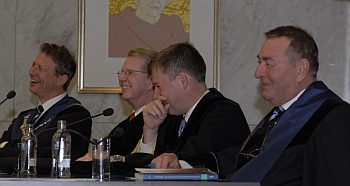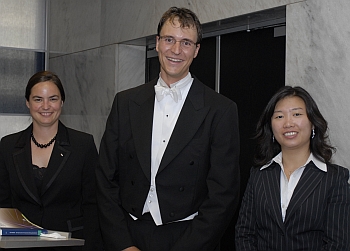The true potential of multi-agent systems
 On June 25, Hans Moonen has defended his PhD thesis entitled “<link erim events _blank>Multi-Agent Systems for Transportation Planning and Coordination”. What are the requirements and key challenges in setting up systems for transportation? Can multi-agent systems contribute to better performing, and easier-to-implement systems for transportation? Multi-agent systems have indeed potential for supply chains, and, in particular, transportation. They can enable a different planning & control paradigm that is focused on coordination through communication & negotiation rather than isolated optimisation, and do not only offer information sharing, but also selective information hiding, which is very important in inter-organisational applications.
On June 25, Hans Moonen has defended his PhD thesis entitled “<link erim events _blank>Multi-Agent Systems for Transportation Planning and Coordination”. What are the requirements and key challenges in setting up systems for transportation? Can multi-agent systems contribute to better performing, and easier-to-implement systems for transportation? Multi-agent systems have indeed potential for supply chains, and, in particular, transportation. They can enable a different planning & control paradigm that is focused on coordination through communication & negotiation rather than isolated optimisation, and do not only offer information sharing, but also selective information hiding, which is very important in inter-organisational applications.
These are some of the initial questions and research findings in Moonen’s thesis. The dissertation details two practical design cases of the application of multi-agent systems (MAS) to the transport of containers. Both cases resulted in concrete prototypes, enabling evaluation of a series of aspects important in applying MAS in transportation. The research in this dissertation along with its key findings provides several handles to help logistics become smarter and more organised.
The dissertation of Hans Moonen distils several lessons suitable to management, which can be valuable input for organisational restructuring and system (re-)design. The two cases he discusses clearly illustrate the potential that multi-agent systems have for spanning organisational boundaries. Moonen identifies that, on top of internal operating costs which can be saved – less planner hours, smarter assignments –, the true potential lies in chain application.
Moonen’s research focus was on practical questions, such as: "Will the introduction of agents result in better performing inter-organisational systems?" and "Will this lead to systems that are easier to implement?" This resulted in main conclusions such as: Multi-agent systems concepts offer true potential for supply chains, and, in particular, transportation activities. They can enable a different planning & control paradigm that is focused on coordination through communication & negotiation rather than isolated optimisation. Next, multi-agent systems do not only offer information sharing, but also selective information hiding, which is very important in inter-organisational applications.
About Hans Moonen:
Hans Moonen was born in Nijmegen, the Netherlands on 9 April 1978. From 1996 to 2002, Hans studied Industrial Engineering & Management Science (Technische Bedrijfskunde) at Eindhoven University of Technology. The last two-and-a-half years of his studies were largely spent in different positions with the enterprise software vendor Baan. At Baan, Hans did an internship (in the Quebec City, Canada office), was employed part-time in the Netherlands as a Jr. Product Consultant and eventually wrote a master’s thesis that constructed a roadmap for collaborative commerce software in the electronics industry.
Hans started as a PhD Candidate in the Department of Decision and Information Sciences at the Rotterdam School of Management, Erasmus University in February 2003, in the group of Prof. Dr. Ir. Jo van Nunen. Hans performed his research largely within the [EET/Senter-Novem] DEAL project (2003-2007), but also worked on the [Connekt] Intelligent Agents project (2003), and the [Transumo] Diploma project (2006-2008).
Hans has (co-)authored a series of papers, and presented his research at several international conferences including: the ECIS 2004, in Turku (Finland); the IEEE IAT 2004 in Beijing (China); the ICEIS 2005 in Miami Beach (US); the ICEB 2005 in Hong-Kong (China).
Next to his work as a researcher, Hans was employed for one day a week for the Commissie Van Laarhoven for a period spanning more than a year. The Commissie Van Laarhoven was a national committee working on innovation in supply chains. Next to that, Hans has worked on several occasions for the European Committee’s IST program as a project evaluator and a project reviewer.
In January 2009, Hans made a career switch to Logica Management Consulting where he is now part of the ITS (intelligent transport systems) consulting practise and among others active in the field of “smart logistics”. In his work at Logica, Hans strives to apply the concepts presented in this dissertation in real practise. Next to his work as a consultant, Hans also has stayed affiliated with acadaemia: one day a week he works as an assistant professor at the University of Twente in the Information Systems & Change Management group. In this way, Hans is truly able to combine and inspire theory with practise, and practise with theory.
 Abstract:
Abstract:
Many transportation problems are in fact coordination problems: problems that require communication, coordination and negotiation to be optimally solved. However, most software systems targeted at transportation have never approached it this way, and have instead concentrated on centralised optimisation.
Multi-agent systems (MAS) are a different approach to building software systems. Such systems are assembled from autonomously interacting agents; agents are small software programs, which have some type of intelligence and individual behaviour. Communication and coordination (between agents) are the essential elements in the construction of MAS. The transportation domain is often referred to as a potential candidate for the application of MAS.
In this dissertation, we discuss two MAS design cases related to the transport of containers. Both cases resulted in concrete prototypes, which let us evaluate a series of aspects important in applying MAS in transportation. We demonstrate the importance of a multi-method validation and evaluation approach. The prototypes were furthermore utilised as artefacts to discuss eventual implementation with future users and experts.
One of the most important observations is that planning, as a function within supply chains, is about to go through a fundamental change. Like the mobile phone changed the way people coordinate in daily life, the concepts discussed in this dissertation have the potential to fundamentally change coordination in supply chains. As part of this fundamental change, a different perspective on certainty and uncertainty is essential.
More Information
Pictures of the Event
Full Text of the Dissertation


